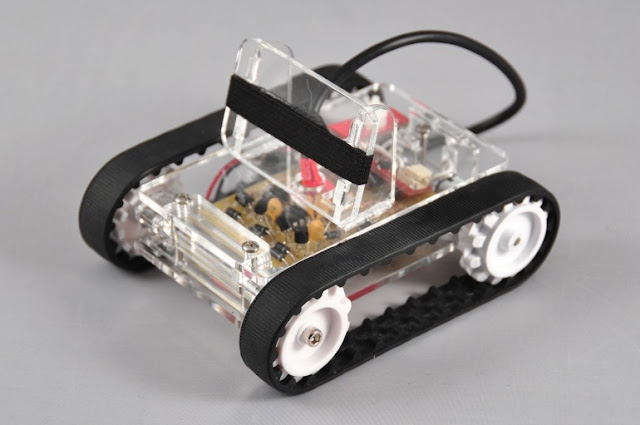When you think about it, smartphones are more than just fancy phones -
they're actually tiny portable computers. Given that so many people now
own these tiny computers, why should they have to pay to buy another
computer that's built into an electronic device, when they could instead
just use their existing smartphone as the "brain" of that device?
That's the approach that has been taken by products such as the Bubo
camcorder rig, and now also by Romo-The Smartphone Robot.
Romo is the creation of Seattle robotics designers Peter Seid and Phu Nguyen.
The hardware consists of a tracked, motorized acrylic base incorporating an analog circuit board, two motors, and an accessory port/stand that can accommodate a mounted smartphone or iPod touch. The base is powered by a rechargeable lithium-ion battery that can be juiced up via an included USB cable.
Romo is the creation of Seattle robotics designers Peter Seid and Phu Nguyen.
The hardware consists of a tracked, motorized acrylic base incorporating an analog circuit board, two motors, and an accessory port/stand that can accommodate a mounted smartphone or iPod touch. The base is powered by a rechargeable lithium-ion battery that can be juiced up via an included USB cable.
Users load one of the Romo apps onto an iOS or Android phone, place it
in the mount on the robot, then use a computer, tablet, or a second
smartphone to remotely control the robot through the first phone. In
cases where the robot has been preprogrammed to carry out a set of
commands, which can be done drag-and-drop style right on the smartphone,
only the one Romo-mounted phone would be required.
One of the apps that has already been created lets users spy on other people, using a real-time feed from the robot phone's camera. Onscreen directional arrows on the controlling device's screen allow users to steer. There's also an augmented reality game in which Romo users race against each other, and a color-tracking app that causes the robot to follow objects of a given color.
Seid and Nguyen invite suggestions for other apps.
Romo is currently in the developmental phase, with funds for commercial production currently being raised on Kickstarter. A pledge of US$78 will get you a Romo of your own, once they're ready to roll.
One of the apps that has already been created lets users spy on other people, using a real-time feed from the robot phone's camera. Onscreen directional arrows on the controlling device's screen allow users to steer. There's also an augmented reality game in which Romo users race against each other, and a color-tracking app that causes the robot to follow objects of a given color.
Seid and Nguyen invite suggestions for other apps.
Romo is currently in the developmental phase, with funds for commercial production currently being raised on Kickstarter. A pledge of US$78 will get you a Romo of your own, once they're ready to roll.




0 comments:
Post a Comment